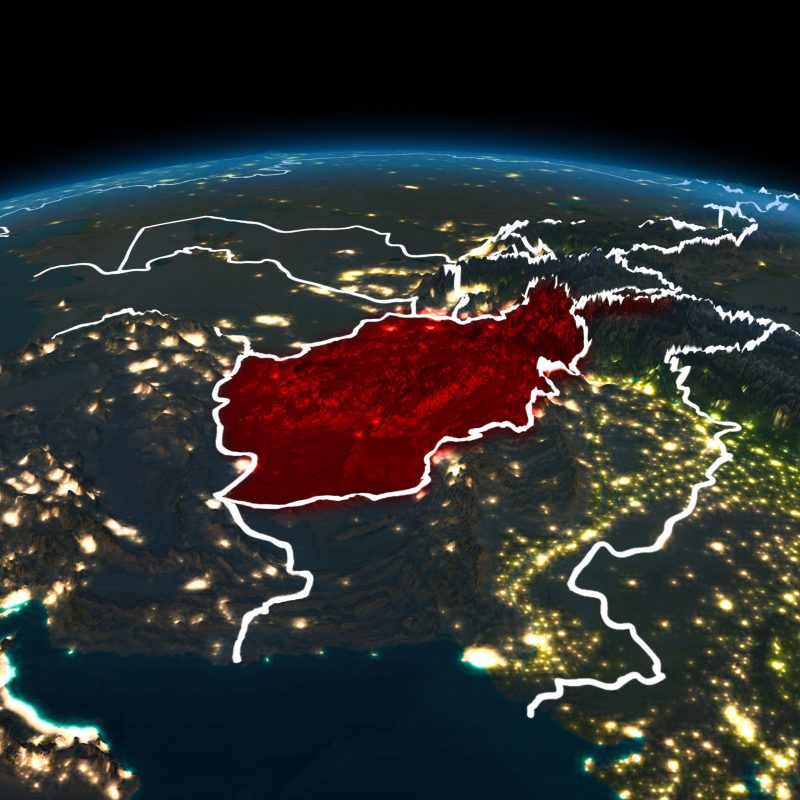
In January 2018, the United States Department of State created a new travel advisory system. Individual countries are ranked as follows:
Level 1 (blue): Exercise normal precautions.
Level 2 (yellow): Exercise increased caution.
Level 3 (orange): Reconsider travel.
Level 4 (red): Do not travel.
The State Department recommends that travelers refrain from visiting the 13 countries in the red. Below, we’ve highlighted these 13 countries and explained why the State Department has singled them out.
1. Afghanistan
Reason for advisory: armed conflict, terrorism, crime, and civil unrest
In Afghanistan in recent years, there have been many incidents of kidnapping and hostage-taking, as well as suicide bombings, military combat operations, and terrorist and insurgent attacks, including attacks using explosive devices, suicide vests, and grenades.
The State Department reiterates that the U.S. Embassy has limited ability to provide routine and emergency services to U.S. citizens in Afghanistan, especially outside of Kabul.
It encourages those who travel to Afghanistan to draft a will, share important documents with loved ones, and establish a personal security plan with their employer.
2. South Sudan
Reason for advisory: crime and armed conflict
Since December 2018, South Sudan has been on the State Department’s advisory list, since foreign nationals have often been victims of rape, sexual assault, and armed robberies.
Violent crime has been increasing exponentially in South Sudan, and there have been many carjackings, shootings, ambushes, assaults, robberies, and kidnappings in the country. There is ongoing fighting between various political ethnic groups throughout the country, and cattle raiding often leads to violence.
The U.S. Department of State advises that travelers to the area exercise extreme caution and avoid border areas as well as demonstrations and public gatherings.
3. Haiti
Reason for advisory: crime and civil unrest
On February 14, 2019, the State Department ordered all non-emergency U.S. personnel and their family members to leave Haiti, due to unpredictable demonstrations throughout the country, especially in Port-au-Prince. These unpredictable demonstrations happening throughout Haiti are violent, and protests, tire burning, and road blocking are frequent.
If you are traveling to Haiti, you should arrange airport transfers and hotel stays in advance, make sure you are not being followed when leaving the airport, and avoid physically resisting any robbery attempt.

4. Iran
Reason for advisory: arbitrary arrest and detention of U.S. citizens
According to the State Department, Iranian authorities continue to unjustly detain and imprison U.S. citizens, including students, journalists, business travelers, and academics. Charges include espionage and posing a threat to national security, and counselor access to detained U.S. citizens is often denied.
Those traveling to Iran should review their personal security plan and enroll in the Smart Traveler Enrollment Program (STEP) to receive alerts and make it easier to be located during an emergency.
5. Iraq
Reason for advisory: terrorism and armed conflict
According to the State Department, U.S. citizens in Iraq are at high risk for both violence and kidnapping. There are currently numerous terrorist and insurgent groups active in Iraq, and these groups target both Iraqi security forces and civilians. There have been a number of attacks involving improvised explosive devices in Baghdad, though this has occurred in several other regions of the country as well.
Travelers headed to Iraq should visit the State Department’s website and review both the High-Risk Area Travelers page and the Traveler’s Checklist page.
6. North Korea
Reason for advisory: serious risk of arrest and long-term detention of U.S. nationals
North Korea is the only country on this list where travel is legally prohibited. Individuals cannot use a U.S. passport to travel to, in, or through North Korea without special validation granted by the State Department.
The U.S. government cannot provide emergency services to U.S. citizens in North Korea, since diplomatic or consular relations with North Korea do not exist at this time.

7. Libya
Reason for advisory: crime, terrorism, civil unrest, and armed conflict
U.S. citizens and other westerners have been kidnapped and held for ransom in Libya, and crime levels in the country are increasing.
Terrorist groups and violent extremist activities remain common throughout the country, with outbreaks of violence between competing arms groups occurring with little warning. Hotels and airports frequented by U.S. citizens and other westerners have been caught in the crossfire between these arms groups.
If traveling to Libya, make sure to carry proof of citizenship and valid immigration status at all times, and make contingency plans to leave.
8. Mali
Reason for advisory: crime and terrorism
Violent crime, including kidnapping and armed robbery, is common in northern and central Mali. Local holidays and seasonal events in the capital city of Bamako, its suburbs, and other southern regions can also be dangerous.
Terrorist and arms groups may attack with little to no warning in Mali, targeting many areas where tourists can be found, including nightclubs, restaurants, hotels, and places of worship.
9. Somalia
Reason for advisory: crime, terrorism, and piracy
Kidnapping, murder, and illegal roadblocks are common throughout Somalia, especially in Puntland and Somaliland. Terrorists plot attacks against airports and seaports, government buildings, hotels, restaurants, shopping areas, and other areas where large crowds gather and where U.S. citizens and other westerners can be found.
Many schools in the area act as “rehabilitation centers” without licensing and oversight and have been reported for physical abuse and for holding people against their will.
In the waters of the Horn of Africa, pirates are active, particularly in international waters near Somalia.

10. Syria
Reason for advisory: terrorism, civil unrest, and armed conflict
The Syrian Civil War has been ongoing since 2011, and according to the State Department, no part of Syria is safe from violence, including kidnappings and the use of chemical warfare, shelling, and aerial bombardment. Hardship throughout the country has increased due to the destruction of infrastructure, housing, medical facilities, schools, and power and water utilities.
Those traveling to Syria should develop a communication plan with family and/or employers before traveling through high-risk areas.
11. Venezuela
Reason for advisory: crime, civil unrest, poor health infrastructure, and arbitrary arrest and detention of U.S. citizens
Ongoing political instability and crisis throughout Venezuela caused the State Department to include the country on its advisory list in January 2019. The State Department ordered non-emergency U.S. government employees and their family members to leave the country.
Political rallies and demonstrations are common throughout Venezuela due to the socioeconomic and political crisis that began in 2010 under Hugo Chávez and has continued under Nicolás Maduro. Demonstrations bring in large police and security forces that use tear gas, pepper spray, water cannons, and rubber bullets against civilian participants. These clashes can also result in looting and vandalism.
12. Yemen
Reason for advisory: terrorism, civil unrest, health risks, and armed conflict
The Yemeni Crisis began with the 2010-11 revolution against President Abi Abdullah Saleh, who led Yemen for more than three decades. The crisis in Yemen has its roots in the failure of a political transition after the revolution that was supposed to bring stability to the country.
Terrorist groups in Yemen tend to target public sites, including transportation hubs, markets, shopping malls, and local government facilities. Employees of western organizations may be targeted for attacks or kidnappings.
13. Central African Republic
Reason for advisory: crime and civil unrest
The Central African Republic Civil War has been ongoing since 2012, primarily involving the government, rebels from the Séléka coalition, and Anti-balaka militias.
Violent crimes are common throughout the Central African Republic, and large areas are controlled by armed groups who kidnap, injure, and kill civilians regularly.
The U.S. Department of State strongly encourages travelers heading to the Central African Republic to appoint one family member to serve as the point of contact for hostage-takers, the media, U.S. and host country government agencies, and members of Congress.

